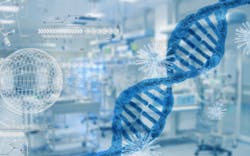Researchers at University of California San Diego have developed SENSR, a CRISPR-based rapid diagnostic tool for SARS-CoV-2.
The new SENSR (sensitive enzymatic nucleic acid sequence reporter), described in a paper published in the journal ACS Sensors, is based on CRISPR gene-editing technology that allows speedy detection of pathogens by identifying genetic sequences in their DNA or RNA.
Currently, many human pathogens are detected using a method known as real-time polymerase chain reaction, or RT-PCR. While highly accurate and sensitive, such diagnostics are time consuming and require specialized laboratory equipment, limiting their use to health and specialized facilities.
SENSR is designed to simplify the SARS-CoV-2 detection process with a goal of eventual adaptation for in-home use.
While the Cas9 enzyme has been used extensively in CRISPR genetic engineering research, scientists have recently employed other enzymes such as the Cas12a and Cas13a for the development of highly accurate CRISPR-based diagnostics. U.C. San Diego claims that SENSR is the first SARS-CoV-2 diagnostic to leverage the Cas13d enzyme (specifically a ribonuclease effector called “CasRx”).
“CRISPR has significantly advanced our capabilities for rapid identification of infected individuals and offers point-of-care testing in low-resource settings that previously wasn’t possible,” said UC San Diego Biological Sciences Professor Omar Akbari, the study’s senior author. “SENSR further opens the toolbox for CRISPR diagnostic systems and will help detect emerging pathogens before they become pandemics.”
Early tests in SENSR’s development demonstrated SARS-CoV-2 detection in less than an hour. The researchers note in the paper that further development is needed, but the technology has the potential to become a “powerful molecular diagnostic with numerous applications.”
Akbari is a co-founder with equity interest, and former consultant, scientific advisory board member and income recipient of Agragene.

